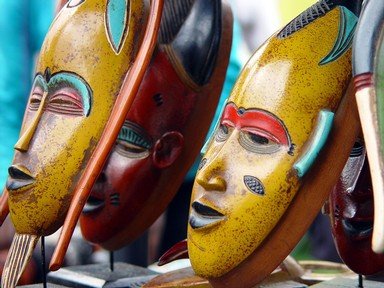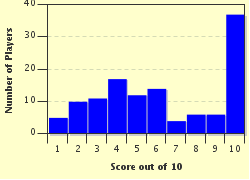Quiz Answer Key and Fun Facts
1. Where in west Africa would you find Ewe people?
2. In Ewe culture, the founder of a tribe became chief and was usually succeeded by which descendants?
3. Ewe chiefs are now usually elected by the people. A chief must follow certain guidelines in his behavior. Which is NOT permitted?
4. The Ewe weave a traditional cloth called 'kente'. Its pattern is said to represents what motion?
5. The Ewes trace their ancestors back to whom?
6. The Ewes underwent many changes and splits before settling in their current lands. While they were settled at Ile (aka Ife) in Yorubaland, what ancient art did they recover from the natives?
7. One of the split groups of Ewe peoples settled for awhile in Dogbonyigbo and established which kingdom?
8. Amega Wenya was the leader of the Ewe from their Dahomey kingdom to the Togo area. He led ten or more tribes south to the coast. What was exclaimed by the leader's son when he first beheld the seashore?
9. The Ewe do not formally name their children when they are born, but on the 8th day when they have seen something of the child's character. Until then what is used to name babies?
10. Ewe religion is primarily polytheistic, although some Ewe are Muslim or Christian. Mawu and Lisa are the primary goddess/god. They are considered how?
Source: Author
alexis722
This quiz was reviewed by FunTrivia editor
stedman before going online.
Any errors found in FunTrivia content are routinely corrected through our feedback system.

